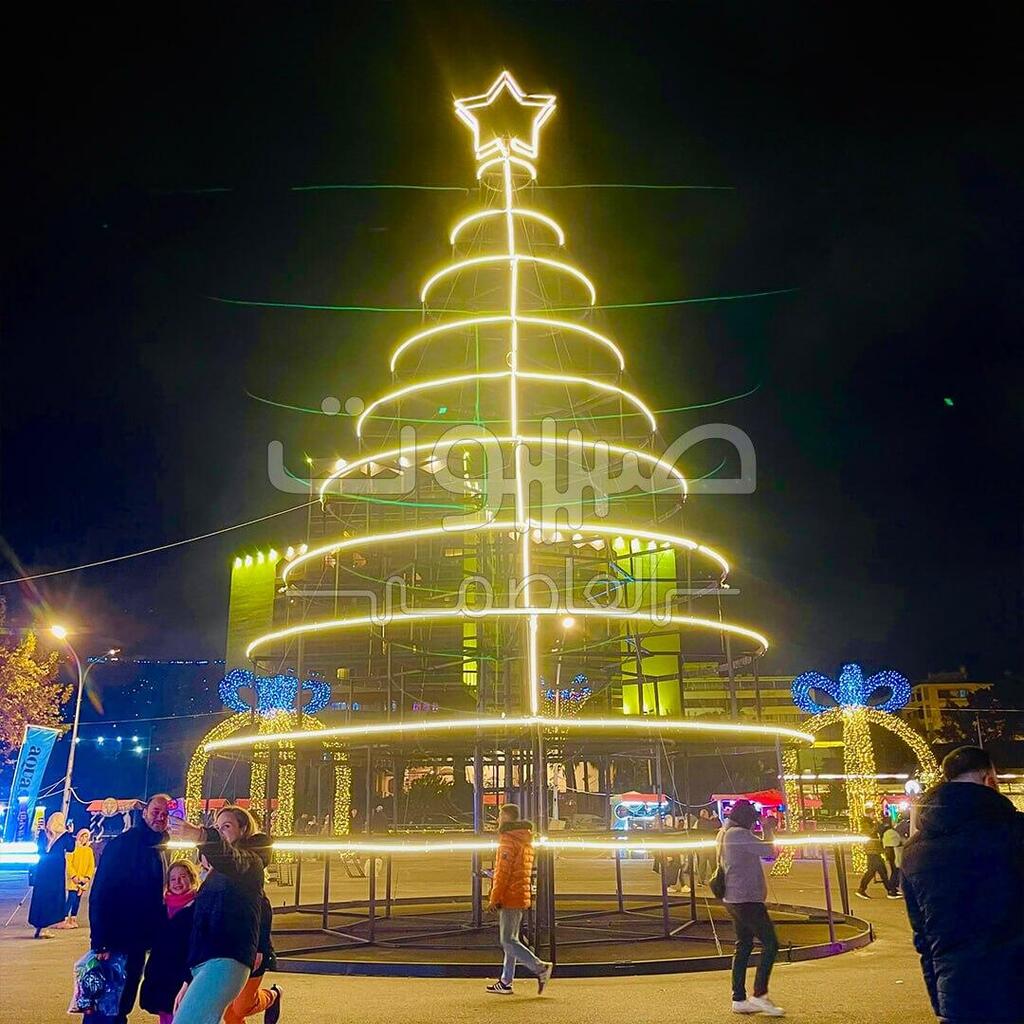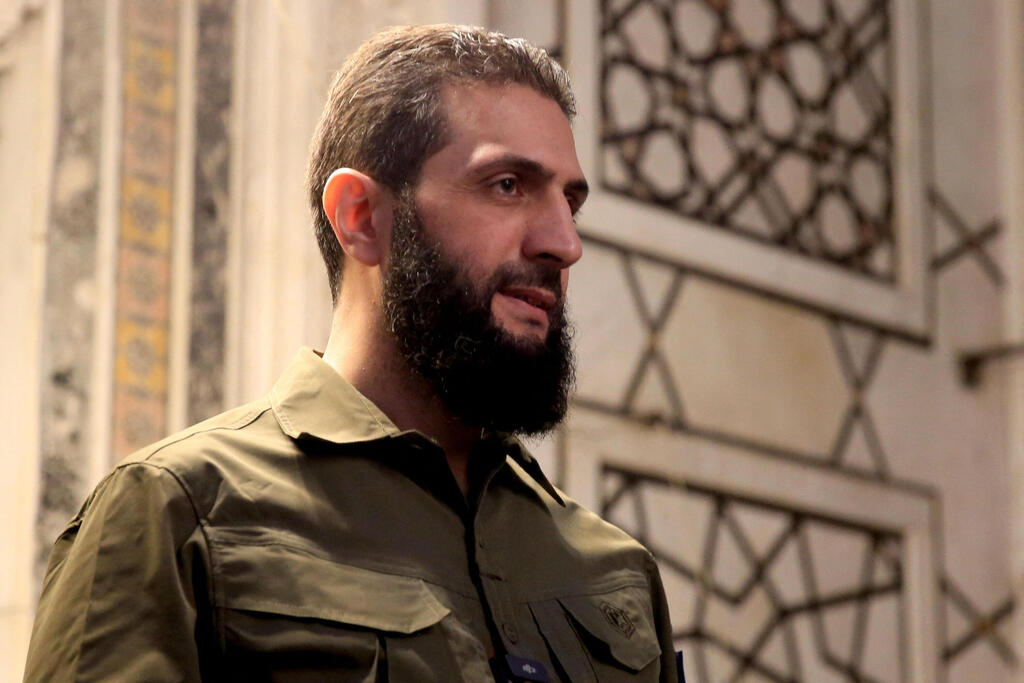Getting your Trinity Audio player ready...
Christmas has arrived, and Christians in Syria, Lebanon and neighboring Arab countries are preparing for the holiday amid a backdrop of recent upheavals in the region.
In Syria, Christmas trees have been lit in the streets, including in the capital Damascus. However, for many Christians, the holiday spirit is tempered by mixed feelings—joy on one hand and uncertainty about the new regime on the other.
Although the lives of Christians in Syria have remained relatively stable since the fall of Bashar Assad’s regime, there is growing apprehension about what the future might hold under the rule of religiously motivated armed factions.
While the new Syrian government, led by Ahmad al-Sharaa, formerly known as Abu Mohammed al-Golani, has pledged to dismantle these groups, it also portrays itself as a unifying force, aiming to represent all religions and communities in Syrian society.
The festive atmosphere across Damascus and other parts of Syria is tinged with fundamental questions about the future of Christians in the reshaped Syrian state. In interviews with Arab media, Syrian Christians have expressed both hope and concern.
“Right now, we are preparing for Christmas and hoping the rebel operations administration will assist us. Syria belongs to everyone, open to all religions," said one Christian resident. Another added, "We have lived together—Muslims and Christians—all our lives, loving one another and celebrating holidays together."
Apprehension aside, some see the illuminated Christmas trees lining the streets as a positive sign of better days ahead. Speaking to the Saudi news network Al Arabiya, Mohammad Sabra, a negotiator for the Syrian opposition during the Geneva peace talks, noted that while some fear the new regime will adopt a religious tone, it was Assad's regime that actively sowed division among Syrians.
A recent Wall Street Journal article highlighted that when armed factions first took control of various areas in Syria, they distributed bread and gifts to children in Christian neighborhoods, assuring residents they had nothing to fear.
However, in Homs, some claimed militants attempted to close alcohol shops and remove crosses from Christian-owned vehicles. These incidents, though troubling, appeared to be isolated and counter to the official policies of Syria's new leadership.
“Rebels are asking Christians to continue practicing their religious traditions and fully celebrate Christmas,” said a resident named Ammar Fahouri in an interview. “We are still afraid of the uncertain future and haven’t yet reached a stage of full confidence, but their words, actions and respect for everyone help ease some of the fear.”
Meanwhile, a businessman from Aleppo expressed skepticism: “We are still in the stage of promises. Is this propaganda to build trust abroad, only to change later, or is it genuine? Time will tell.”
Jiris Jabra, a Christian resident of Tartus, said he felt relieved by Assad's departure: "We are optimistic because those who overthrew the regime are taking steps to ensure safety and security." The report also noted that many Christians fled their homes as rebels advanced but returned within days to protect their properties.
'In 30–40 years, there will be no Christians in Syria'
The article pointed out that during decades of Assad family rule, Christians and Muslims coexisted with minimal friction. However, the civil war tested Christian communities severely. As the conflict took on sectarian dimensions, many Christians sided with the regime or refrained from opposing it openly. Church leaders, in particular, had longstanding ties to the regime and its intelligence services.
Although there is no precise count of the Christian population in Syria, estimates from international charities and local communities peg the number between 200,000 and 600,000—no more than 1.5% of the population. Before the war, Christians made up about 10% of Syria’s population, but the significant exodus of refugees drastically reduced their numbers.
The treatment of minorities is now a critical test for Syria’s opposition forces, particularly for al-Sharaa’s Hayat Tahrir al-Sham organization, which has, in recent years, emphasized its break from its jihadist origins.
The Wall Street Journal further reported that many young Christians are emigrating from Syria. A young Christian travel agency owner from Aleppo told the paper that, despite his optimism for Syria’s future, he is still contemplating emigration, believing the region will remain mired in conflict. “In 30–40 years, there will be no Christians in Syria because everyone will have left,” he said. “Those who cannot leave will either be old or dead.”
The report warned that this ongoing emigration could threaten the historical presence of Christians in Syria. Marguerite Kalenderian, an Armenian Christian who previously lived in northwest Syria but emigrated to Dubai in 2021, expressed concern about the new leadership. "They were part of ISIS and Al Qaeda—how can I trust someone who was a terrorist just two days ago?" she asked, reflecting fears about possible restrictions on freedoms, including forcing women to cover their hair.
In southern Lebanon, Christmas trees remain unlit due to lack of electricity
Lebanon is also celebrating Christmas, though the festivities are shadowed by economic hardship and the aftermath of the war. The country, already in the grips of a severe financial crisis, has seen its situation further worsen. This holiday season, Lebanon is relying heavily on tourism to generate much-needed revenue. Social media videos show glimpses of the holiday spirit in Beirut, despite the challenges.
Get the Ynetnews app on your smartphone: Google Play: https://bit.ly/4eJ37pE | Apple App Store: https://bit.ly/3ZL7iNv
The Lebanese army has leveraged the holiday season by hosting a booth at a Christmas exhibition in the Forum De Beyrouth event complex in the capital. Facing numerous challenges and tasked with additional missions following the cease-fire with Israel, the army is now actively recruiting soldiers and raising funds. At the event, the army displayed a sign listing "volunteer terms for the army," which has also circulated on social media in recent weeks to attract new recruits.
In southern Lebanon, however, holiday atmosphere is far more subdued. In ravaged border villages and areas still experiencing military activity, Christmas celebrations are muted.
The Lebanese newspaper An-Nahar shared a video showing a resident of the Christian village Dardara, near Tyre, placing a Christmas tree atop the ruins of the local church, which was damaged in airstrikes. Hezbollah had reportedly used sites, including religious institutions, for hiding, storing ammunition and launching attacks on Israeli territory. According to the report, the Christmas tree in the village remained unlit because electricity had not yet been restored, and most residents had yet to return.





